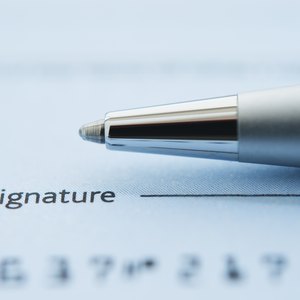
Not having enough money in your bank account to cover a check you've written is a nerve-wracking experience. Several things can happen that ultimately depend on how your bank processes the check. In most worst-case scenarios, you might need to make an embarrassing phone call to the person or business to whom you wrote the check and pay extra fees. However, if you make a habit of writing checks that can't be honored by your bank – commonly referred to as bouncing checks – you could face harsher consequences.
When the Check is Paid
Depending on your bank’s policies, your bank may choose to pay the check when it is presented to your account, even if you don't have funds available to cover it. Ultimately, your bank decides whether it will honor the check and the decision may be based on your overdraft history, whether you have overdraft protection coverage and how much paying the check will overdraw your account. In most cases, you will still be charged an overdraft fee, even if the bank decides to pay the check.
When the Check is Returned
If your bank chooses not to pay a check that you do not have enough funds to cover, it will return the check as unpaid because of nonsufficient funds. The bank will also charge an NSF fee to your account. In this case, you will still owe the company or person who deposited the check, but you'll also owe the bank for processing the check. Most banks charge an NSF fee of $30 to $45 for each item it processes against an overdrawn account. Some banks may also charge an additional fee for each day your account remains overdrawn.
Facing Possible Merchant Fees
When a check you write to a company is returned, the merchant may also charge a fee. This is in addition to any NSF fees you pay the bank. The merchant’s fee may be assessed to cover returned deposit fees the company pays as a result of your check being returned, plus administrative costs the company incurs to try to collect your payment. Although not every merchant will charge a returned item fee, many do.
If a check you write is not honored by the bank, contact the merchant as soon as possible. In some cases, a merchant may be willing to waive any additional fees it may charge if you are up front about the mistake and make arrangements to make good on the check. However, some merchants may also require you to replace the check with a money order or cashier’s check.
Bad Check System Reporting
If you write checks that you don’t have enough money to cover, you could be reported to a national check reporting system, such as TeleCheck or ChexSystems. These companies record information about bad check writers and a report in these systems may cause your checks to be declined for future purchases. In some cases, a merchant or person may also report a bad check to state authorities, and you could face criminal charges.
Usually, these measures are reserved for people who write bad checks often, or those who do not make arrangements for an unpaid check to be honored. To reduce the risk of these consequences, arrange to pay checks returned by your bank as soon as possible and make sure you have enough money in your account to cover future checks.
References
- Citizen's Bank: Understanding Your Overdraft Protection Choices
- Bank of America: Account Fees
- HelpWithMyBank.gov. "Dictionary of Banking Terms and Phrases." Accessed April 13, 2020.
- Board of Governors of the Federal Reserve. "Consumer Compliance Handbook: Regulation CC Availability of Funds and Collection of Checks," Page 6. Accessed April 13, 2020.
- Office of Financial Management. "85.22 Deposit Adjustments and Returned Payments." Accessed April 13, 2020.
- Santander Bank. "What Is a Returned Deposited Item?" Accessed April 13, 2020.
- HelpWithMyBank.gov. "Answers About Funds Availability: I Deposited a Local Check. When Will My Funds Be Available/Released From the Hold?" Accessed April 13, 2020.
- Office of the Comptroller of the Currency. "Checking Accounts: Understanding Your Rights." Accessed April 13, 2020.
- HelpWithMyBank.gov. "Answers About Overdraft/NSF Fees and Protection: How Many Times Will a Bank Allow an Insufficient Funds Check to Be Redeposited/Resubmitted?" Accessed April 13, 2020.
- VeriCheck. "State Allowed NSF Fees." Accessed April 13, 2020.
- Federal Deposit Insurance Corporation. "Have You Bounced Yourself Out of a Checking Account?" Accessed April 13, 2020.
- Consumer Financial Protection Bureau. "I Bounced a Check. Will This Show up on My Credit Report?" Accessed April 13, 2020.
- Washington State Legislature. "Unlawful Issuance of Checks or Drafts." Accessed April 13, 2020.
- Consumer Financial Protection Bureau. "A Closer Look: Overdraft and the Impact of Opting-In," Page 1. Accessed April 13, 2020.
- Wells Fargo. "Verification of Wells Fargo Accounts." Accessed April 13, 2020.
- MSU Texas. "Returned Check Policy." Accessed April 13, 2020.
- U.S. Department of Treasury. "U.S. Treasury Check Security Features," Page 1. Accessed April 13, 2020.
- Cross Check. "Use Check Verification to Authorize Checks." Accessed April 13, 2020.
Writer Bio
With a background in taxation and financial consulting, Alia Nikolakopulos has over a decade of experience resolving tax and finance issues. She is an IRS Enrolled Agent and has been a writer for these topics since 2010. Nikolakopulos is pursuing Bachelor of Science in accounting at the Metropolitan State University of Denver.

